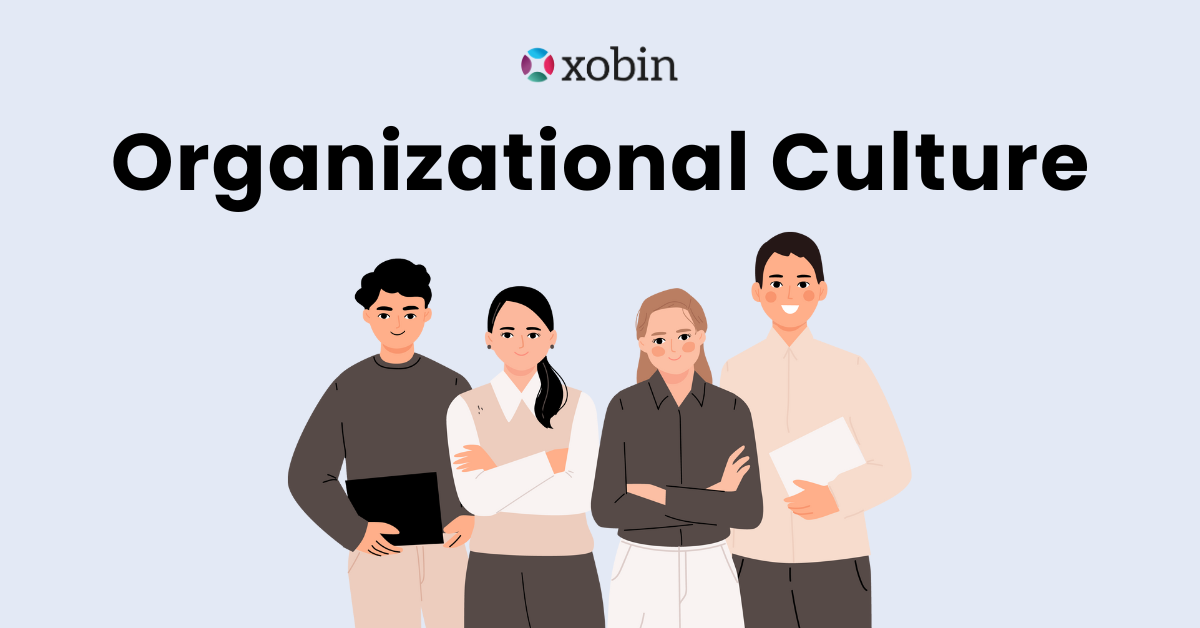XOBIPEDIA
HR Glossary

What is Organizational Culture?
Organizational culture refers to the way of working in a company. The culture in an organization is formed by the beliefs, assumptions, and values of the company.
Just like human beings have certain personality traits that differentiate them from everyone. Every company also has a set of certain traits that sets them apart from each other and builds its company culture.
The way everyone in the company works interacts and the working environment, all of this also contributes to the working culture of the company.
Importance of Organizational Culture
It has a direct impact on the success and growth of the business. The workings of a business depend on the way that people work in a company. Employees don’t just work for money, but they work for the way of living and need a suitable culture for that ideologies, beliefs, values, and the way people interact with each other, all come under organizational culture.
Here are some of the reasons for maintaining a good organizational culture-
- It helps in improving employee retention and reduces employee turnover. If everyone is feeling respected and valued at their company, people are not likely to leave. Employee happiness should be the ultimate goal of the organizational culture, and it will automatically result in reduced employee turnover.
- A good company culture has an impact on the mentality of the employees. It helps in increasing employee productivity. People are more likely to work at their best self when they don’t have to worry about anything else and be happy in what they do.
- It helps in improving employee engagement. In a culture with absolute clear goals and expectations, employees are likely to work at their best selves. It motivates the employees and makes them engage fully in their work. Employee engagement also leads to higher productivity levels in the long run.
- A good working culture within your company will help you foster a healthy working environment. A company with clear sets of goals and values works in harmony and has a good working environment, where people feel valued and enjoy working.

How to Measure Organizational Culture?
Being understood, the importance of work culture in the company, it becomes necessary to understand how to actually measure that.
Like any other thing, the best way to measure organizational culture is to take feedback, understand the culture in depth by feedback through surveys, and acknowledge the voice of your employees.
Here are some ways you can measure your organizational culture-
- Culture surveys are a great way of understanding the practices of your company from the viewpoint of your employees. Such surveys are used to identify the collective behavioral patterns. It means they help in identifying the overall patterns of a company from an objective point of view. Employees are not asked for their personal opinion but are asked about what actually happens in the company.
- Engagement surveys are yet another way of measuring organizational culture. Engagement surveys measure whether the employees are fully engaged in the company or not. It helps in understanding how far the employees are willing to go for the company. It is a measure of employee engagement that can only be possible due to a good organizational culture. Higher engagement scores reflect a good organizational culture.
- Pulse checks are another survey method, similar to engagement surveys. Pulse surveys are long-form surveys that always ask the same questions and help in developing a trend analysis. In this survey, pulse refers to a snapshot of time. It helps in understanding the trend of engagement within the company.
Effective Strategy on How to Create an Organizational Culture?
Employee Recognition
Employee recognition has a long-term positive impact on the organizational culture. When employees start getting recognized even for their little accomplishments, they get a sense of fulfillment and feel a part of the team. It helps in building a great organizational culture.
Recognition can be in any form. It might be just acknowledging the fact and praising your employees or recognizing them with some monetary benefits or any gift for that matter.
The most important thing to keep in mind is to make this a regular process if you want to build a good organizational culture.
Open Communication
Open communication helps the employees in voicing out their opinions to their superiors without any fears. Companies with a large number of employees often face the problem of ineffective communication.
Building a culture of open communication in which anyone can speak to anyone and have healthy discussions creates a long-term positive impact on the organizational culture.
Employee Assessment Programs
Performance appraisal is one way that helps the employees in understanding how they’re doing and allows the employees to grow. Performance appraisals should be carried out regularly to have a transparent relationship between the employees and the employer.
Having an effective employee assessment program will help you build a more open and better organizational culture over time.
Employee Experience
Employee experience is one of the biggest factors contributing to the organizational culture. You should work on improving your employee experience from day one if you want to build a good organizational culture. It is only natural that employees are more likely to work at their best self when they are having a good experience working. It will help the employees to engage more with the company and eventually contribute to the organizational culture.
We hope this blog helps you understand the organizational culture in depth. Keep in touch with Xobin for more interesting blogs.

Recommended Content

Video Interviews can simplify your hiring
Don’t let a packed schedule be a hindrance in recruitment. Use structured interviews with the power of video to screen applicants. Understand the communication skills, motivation, and job skills using video interviews.

Pre-employment Testing: The Complete Guide
Move over from pen-paper based tests and manually checked assignments to pre-employment assessments. Democratize your organization hiring by screening for skills before you interview.

How can Employers adapt to Remote Hiring
With most jobs going remote, your best applicants could be in Melbourne or Miami. From remote screening and virtual interviews to remote onboarding, Learn the best practices to get started.


